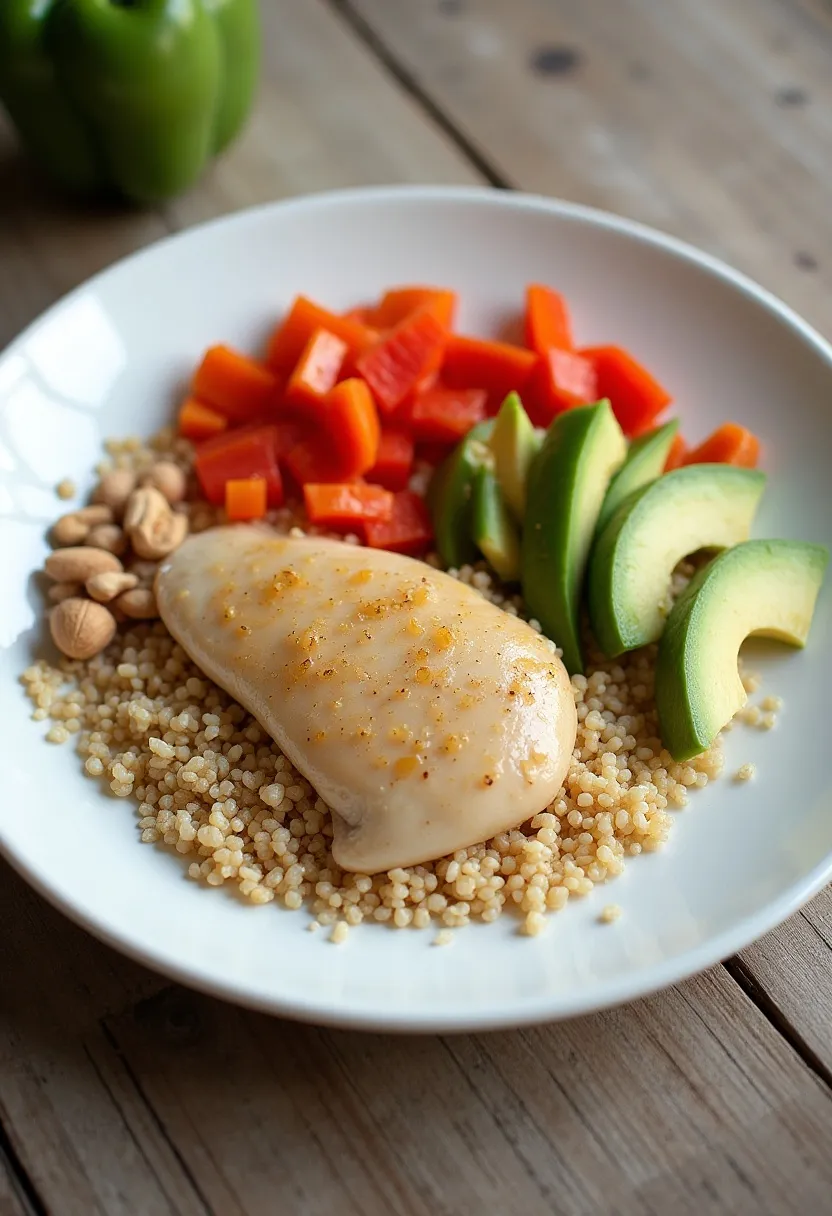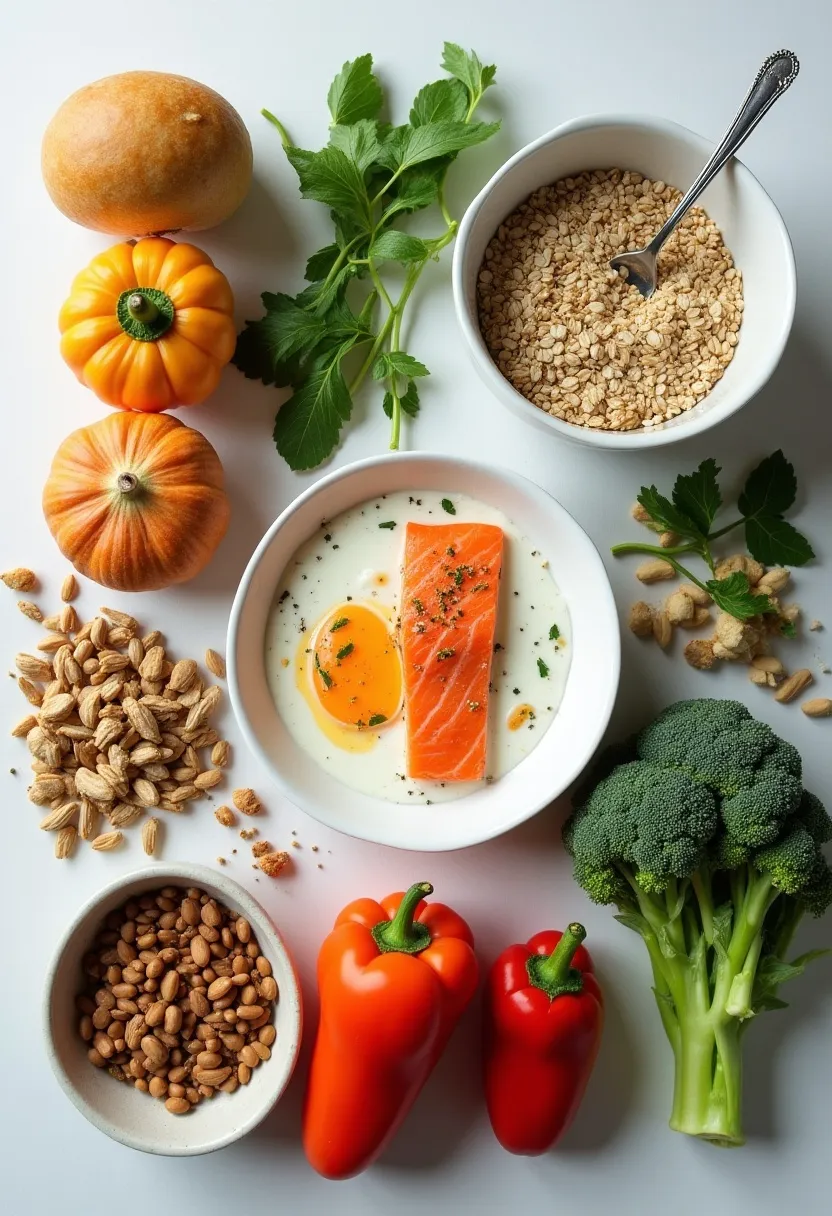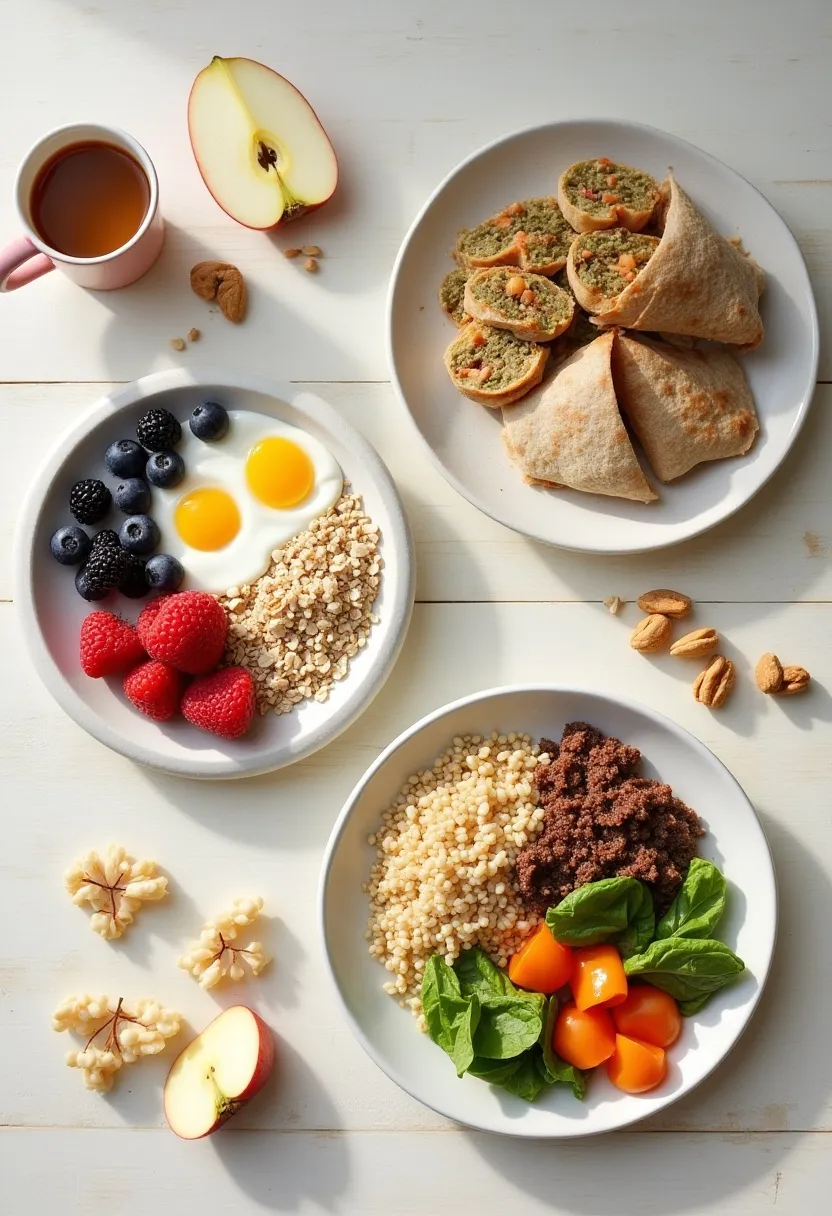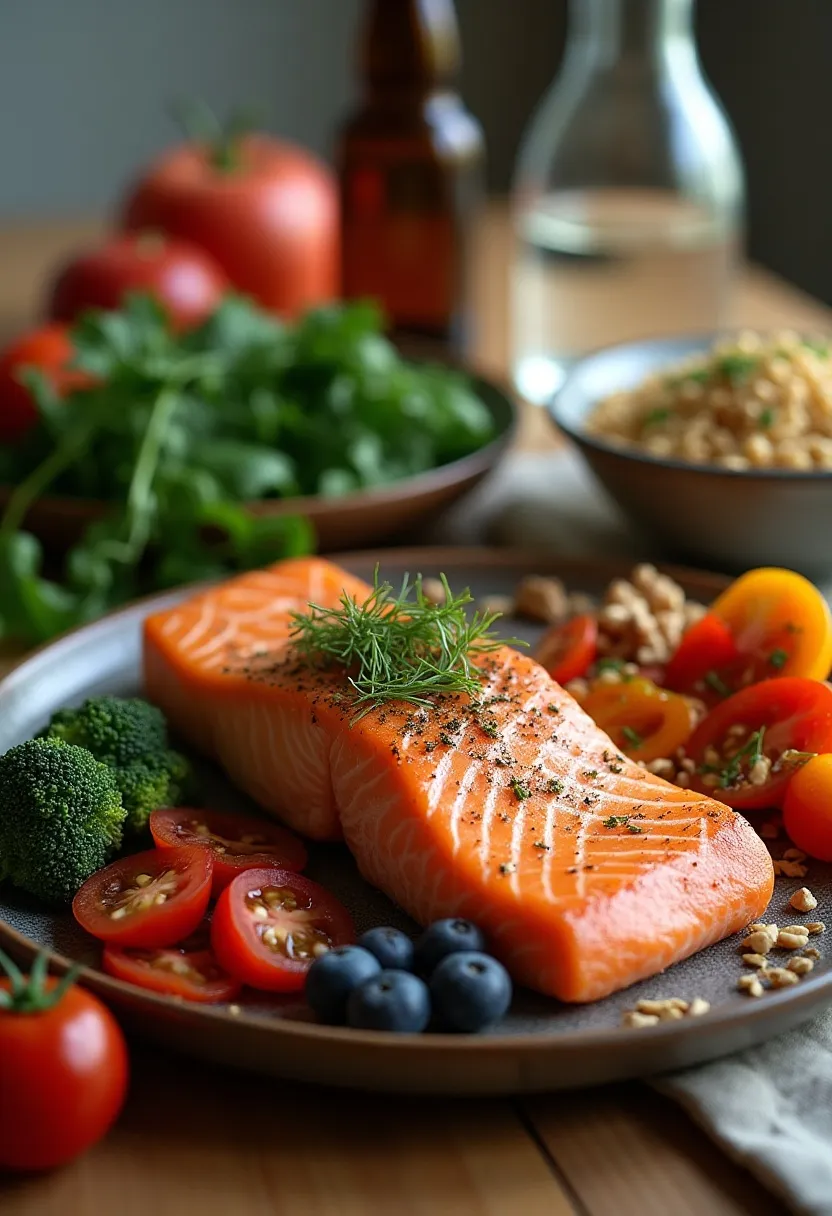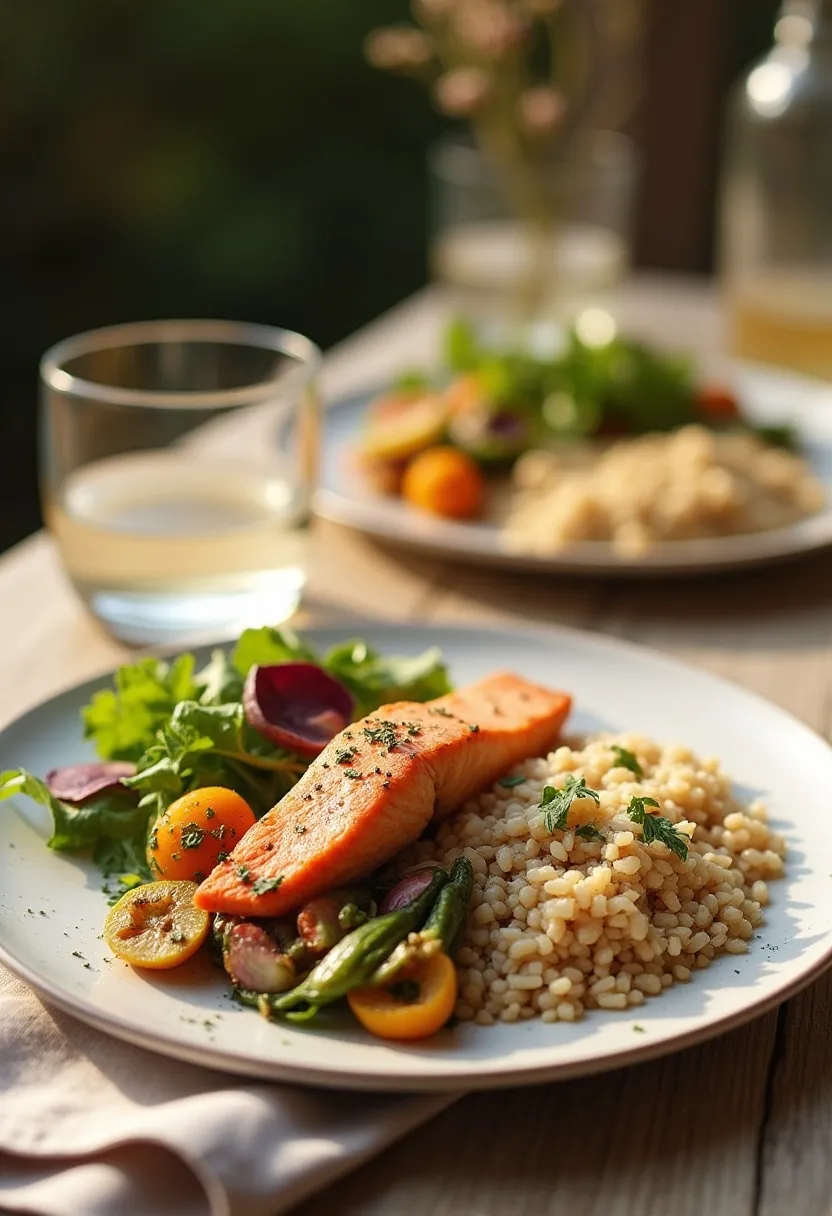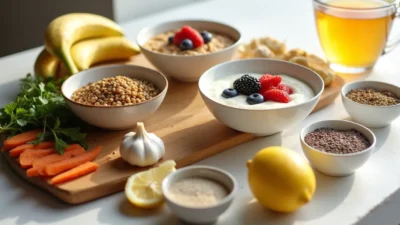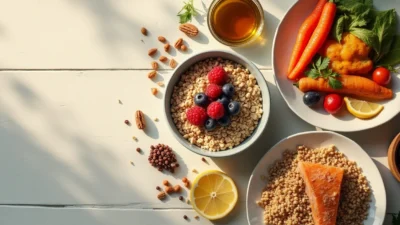Contents
Understanding the Basics — What Is a Balanced Diet?
A balanced diet isn’t about strict rules or counting every calorie.
It’s about giving your body the steady, dependable fuel it needs to stay strong, focused, and energized — whether you’re lifting at the gym, chasing deadlines, or just trying to feel good day to day.
For men, the basics of balanced eating come down to proportion, variety, and consistency. The goal isn’t perfection — it’s building plates that work for your lifestyle and support long-term health.
Carbohydrates: Your Primary Fuel Source
Carbs aren’t the enemy; they’re the body’s preferred energy.
Aim for whole-food carbs like oats, wholegrain bread, quinoa, brown rice, potatoes, and pulses.
For an average moderately active man, this comes to roughly 300g of carbohydrates a day, depending on activity level.
Think of carbs as the steady-burning fire that keeps you going.
Protein: Strength, Repair & Satiety
Protein helps maintain muscle, repair tissues, and keep you fuller for longer.
Great sources include fish, chicken, eggs, beans, lentils, yoghurt, and lean red meat.
Most men need around 55g of protein per day, though active men benefit from more.
A simple guide: a palm-sized portion of protein at every meal.
Healthy Fats: Brain & Hormone Support
Healthy fats keep your brain sharp, support hormones, and help you absorb key nutrients.
Include sources like olive oil, nuts, seeds, avocado, and oily fish.
A thumb-sized portion of fats or a tablespoon of oil per meal is an easy rule of thumb.
Fruits & Vegetables: The Protective Powerhouses
Aim for at least five portions a day — more if you can.
Bright colors = antioxidants that support heart, brain, and cellular health.
They’re also essential for men’s long-term health markers, from cholesterol to blood pressure.
The Big Picture: Balance on Every Plate
A balanced plate can be as simple as:
- ½ vegetables or fruit
- ¼ wholegrain carbs
- ¼ protein
Plus a drizzle of healthy fats.
It’s a pattern more than a prescription — one that keeps your energy even, your focus sharper, and your future healthier.
Key Nutrients Men Often Miss
Even men who eat “pretty well” often fall short on a few essentials.
Life gets busy, meals become repetitive, and certain nutrients quietly slip through the cracks. But these missing pieces can make a big difference — from energy levels and immunity to muscle function and long-term health.
Here are the nutrients men most commonly overlook, and the foods that help fill the gaps.
1. Fibre — The Unsung Hero of Men’s Health
Most men eat far less fibre than recommended, often relying heavily on meat and refined carbs.
Fibre supports digestion, lowers cholesterol, stabilizes blood sugar, and plays a key role in heart health.
Easy fibre boosts include:
- Wholegrain bread
- Oats
- Pulses (beans, chickpeas, lentils)
- Nuts & seeds
- Fruits like berries, apples, pears
A simple swap — white to wholegrain — can noticeably improve how you feel.
2. Omega-3 Fatty Acids — For Brain & Heart Strength
Omega-3s help reduce inflammation and support brain, heart, and joint health.
Many men fall short unless they eat oily fish regularly.
Aim to include:
- Salmon
- Mackerel
- Sardines
- Trout
Or plant-based sources like chia seeds, flaxseeds, and walnuts.
3. Vitamin D — Especially in Winter
Vitamin D plays a role in bone strength, mood, and immunity.
Men living in regions with long winters often don’t get enough sunlight to maintain healthy levels.
Sources include:
- Fortified foods
- Eggs
- Oily fish
- (And supplements, when advised by a healthcare provider)
4. Iron & Zinc — For Energy, Immunity & Vitality
Men need steady iron for oxygen transport and zinc for testosterone function, immunity, and tissue repair.
Good sources:
- Lean meat
- Beans & lentils
- Wholegrains
- Pumpkin seeds
- Shellfish (oysters are zinc powerhouses)
5. Antioxidants — Support for Long-Term Health
Antioxidants protect cells and may play a role in reducing risks related to heart disease and prostate health.
Think colorful fruits and vegetables — the deeper the color, the richer the antioxidants:
- Blueberries
- Spinach
- Broccoli
- Peppers
- Tomatoes
6. Protein Varied Sources — Not Just Meat
While many men get “enough” protein, they often miss the variety that supports gut health and longevity.
Add plant-based proteins like tofu, beans, lentils, and quinoa to diversify nutrients.
Meal Timing & Portion Practicalities
A balanced diet isn’t just what you eat — it’s when and how much.
Many men skip meals, overload at dinner, or grab whatever’s quick between meetings. The good news? A few small shifts in timing and portion awareness can dramatically improve energy, focus, and appetite control.
Start With a Strong Breakfast
Skipping breakfast might feel efficient, but it often leads to energy dips and overeating later.
A balanced morning meal keeps blood sugar steady and supports metabolism.
Aim for:
- Protein: eggs, Greek yoghurt, cottage cheese, or nut butter
- Slow carbs: oats, wholegrain toast, or fruit
- Healthy fats: seeds, nuts, avocado
A simple bowl of oats with nuts and yoghurt is a great daily foundation.
Mid-Morning & Afternoon: Smart Snacks
Instead of letting hunger crash into you mid-afternoon, plan small, steady snacks.
Good options:
- A handful of nuts
- A banana with peanut butter
- Hummus with wholegrain crackers
- Greek yoghurt with berries
These prevent the “I’ll eat anything in sight” moments later in the day.
Lunch & Dinner: Build a Balanced Plate
A practical, easy structure:
- ½ plate vegetables
- ¼ plate protein
- ¼ plate wholegrain carbs
- A small amount of healthy fats
This format helps naturally regulate calorie intake and support muscle health.
Portion Guides You Don’t Need to Measure
No scales needed — just your hands:
- Protein: palm-sized portion
- Carbs: fist-sized
- Fats: thumb-sized
- Veggies: two cupped hands
These work for most men and scale with natural body size.
Evening Eating: Keep It Lighter
Many men tend to “save” calories for late evening, which can affect sleep and digestion.
A more balanced day — steady meals, earlier dinners — supports energy and metabolic health.
Hydration Timing Matters Too
Sipping water consistently throughout the day helps with:
- Focus
- Digestion
- Muscle performance
- Appetite regulation
A simple rule: drink a glass of water with every meal and snack.
Health Concerns & Diet Adjustments for Men
Men’s nutritional needs shift with age, lifestyle, and long-term health risks.
While no single diet fits everyone, certain patterns consistently support men’s wellbeing — especially in the areas where men are most vulnerable: heart health, metabolic balance, and prostate health.
1. Heart Health — The Big Priority
Heart disease remains one of the top health concerns for men, particularly after age 40.
Diet plays a powerful protective role.
Support heart health by focusing on:
- High-fibre foods: oats, beans, wholegrains
- Healthy fats: olive oil, nuts, seeds, oily fish
- Plenty of vegetables and fruit
- Reducing processed meats and salty foods
Small habits add up — like choosing salmon once a week or swapping butter-heavy meals for olive-oil-based cooking.
2. Type 2 Diabetes & Blood Sugar Control
Many men experience midlife weight gain, rising stress, and more sedentary habits — all of which affect blood sugar.
Stabilize energy and support metabolic health with:
- Slow-release carbs (oats, brown rice, quinoa, sweet potatoes)
- Lean proteins at each meal
- Fibre-rich vegetables
- Minimizing sugary drinks and refined snacks
This isn’t about restriction — it’s about choosing foods that help you stay steady, not spiking and crashing.
3. Prostate Health
A balanced diet is linked to long-term prostate wellbeing, especially as men age.
Helpful foods include:
- Tomatoes (rich in lycopene)
- Cruciferous veg (broccoli, cauliflower, kale)
- Pumpkin seeds (zinc support)
- Soy foods like tofu or edamame
These provide antioxidants and anti-inflammatory benefits that support cellular health.
4. Muscle & Bone Health — Staying Strong as You Age
After age 30, men naturally begin to lose muscle mass — slowly at first, then more noticeably after 40.
Support strength by:
- Eating enough protein throughout the day
- Staying active with both cardio and resistance training
- Getting enough calcium, vitamin D, and magnesium for bone health
Oily fish, fortified foods, leafy greens, dairy or fortified plant milks all help keep bones resilient.
5. Healthy Weight Maintenance
For many men, weight gain creeps in quietly through inconsistent meals, oversized portions, and high-calorie convenience foods.
Balanced eating helps regulate appetite naturally:
- More whole foods
- More fiber
- Fewer refined snacks
- Mindful evening eating
- Steady meals rather than skipping and overeating later
It’s a sustainable approach, not a quick fix.
Putting It Into Practice — Simple Plate Ideas
Healthy eating doesn’t need to be complicated.
Most men don’t need gourmet recipes or strict plans — just clear, simple combinations that deliver steady energy, nutrients, and satisfaction.
Here are easy, balanced meal ideas you can build any day of the week.
🏁 Breakfast Ideas — Start Strong
1. Protein-Packed Oat Bowl
- Oats cooked with milk
- A scoop of Greek yoghurt
- Handful of berries
- Spoon of nuts or seeds
✔ High in fibre, protein, and antioxidants. Keeps you full for hours.
2. Veggie Egg Scramble
- Eggs or egg whites
- Spinach, peppers, mushrooms
- Wholegrain toast
✔ Quick, energizing, great for metabolism and muscle repair.
🥗 Lunch Ideas — Balanced & Efficient
1. Wholegrain Wrap with Lean Protein
- Wholegrain tortilla
- Turkey or grilled chicken
- Lettuce, tomatoes, avocado
- A drizzle of olive oil
✔ Easy to pack, high in protein and healthy fats.
2. Power Bowl
- Brown rice or quinoa
- Mixed vegetables
- Beans, lentils, or grilled salmon
✔ Excellent for heart health and long-lasting energy.
🍽️ Dinner Ideas — Satisfying, Not Heavy
1. Salmon + Sweet Potato + Greens
- Oven-baked salmon
- Roasted sweet potato
- Broccoli or green beans
✔ Rich in omega-3s and vitamins for heart and brain.
2. Lean Beef Stir-Fry
- Lean beef strips
- Mixed vegetables
- Wholegrain noodles
✔ High iron, high protein, colorful, and quick.
🥜 Snack Ideas — Smart Fuel, No Crash
- Greek yoghurt + honey + nuts
- Hummus with carrots or wholegrain crackers
- Almonds or mixed nuts (small handful)
- Apple + peanut butter
✔ Keeps blood sugar stable and prevents overeating later.
⏱️ For Busy Days: Quick Swaps
- White rice → brown rice or quinoa
- White bread → wholegrain
- Sugary drinks → water or sparkling water
- Chips → nuts or roasted chickpeas
- Heavy sauces → herbs, spices, lemon, olive oil
These swaps improve energy, digestion, and overall nutrient balance — without sacrificing flavor.
Conclusion: Fuel Well, Feel Well
Eating well isn’t about strict rules or chasing the perfect diet.
For most men, it comes down to a handful of steady habits — choosing whole foods more often, building balanced plates, eating regularly, and giving your body what it needs to stay strong and focused.
A balanced diet supports everything you care about:
your energy, your workouts, your sleep, your mood, and your long-term health.
Small choices really do add up — the bowl of oats in the morning, the extra serving of vegetables, the swap to wholegrains, the decision to cook at home a little more often.
Think of food as fuel, but also as support.
Support for your mind on stressful days, for your muscles when you train hard, for your heart and health as you age.
You don’t need to overhaul your habits overnight.
Just start where you are, make one change this week, then build from there.
Your future self — stronger, clearer, healthier — will thank you.


